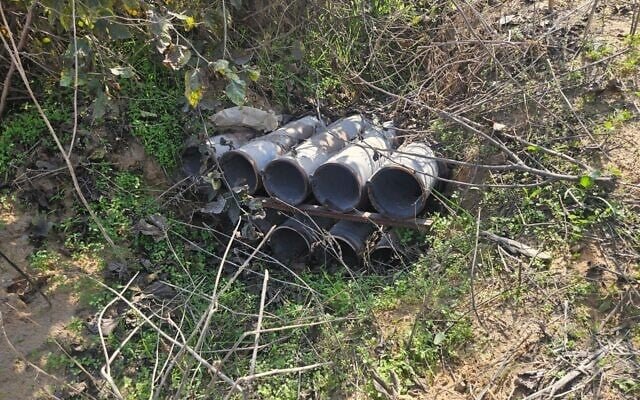The Times of Israel is liveblogging Friday’s events as they happen.
IDF says troops found rocket launchers in northern Gaza aimed at Israeli communities Several rocket launchers were found by troops of the Kfir Brigade during operations in northern Gaza’s Beit Lahiya, the military says. According to the IDF, the launchers were aimed at Israeli border communities. Meanwhile, in southern Gaza’s Rafah, a drone strike killed a group of gunmen moving toward troops of the Nahal Brigade operating in the area, the IDF adds.
UN nuclear watchdog says Iran agreed to additional monitoring at Fordo enrichment plant Iran has agreed to additional monitoring measures by the UN nuclear watchdog at its Fordo enrichment plant after it voiced plans to significantly increase its production of highly enriched uranium at the site, the agency says in a report seen by AFP. The International Atomic Energy Agency said last week that Iran had revamped its Fordo enrichment plant, south of Tehran. The changes would “significantly increase the rate of production of uranium enriched up to 60 percent”, the agency said — close to the 90 percent needed to make a nuclear weapon. The rate of production will jump to more than 34 kilograms of highly enriched uranium per month, compared to 4.7 kilograms previously, it added. The IAEA called on Iran to implement inspections urgently, while European powers pressed Tehran to “immediately halt its nuclear escalation.” “Iran agreed to the Agency’s request to increase the frequency and intensity of the implementation of safeguard measures at FFEP,” the IAEA says in a confidential report seen by AFP. Iran insists on its right to nuclear energy for peaceful purposes and has denied any ambition of developing weapons capability. However, US intelligence agencies and the IAEA say Iran had an organized military nuclear program up until 2003, and continued to develop its nuclear program beyond civilian necessity. Israel contends that the Islamic Republic never truly abandoned its nuclear weapons program and many of its nuclear sites are buried under heavily fortified mountains. Times of Israel Staff contributed to this report.
Katz says IDF troops will stay atop Syrian side of Mount Hermon during winter months Defense Minister Israel Katz says he has ordered the military to prepare to stay atop the Syrian side of Mount Hermon during the coming winter months. “Due to what is happening in Syria, there is a huge security importance to our holding of the Hermon peak and everything must be done to ensure the IDF’s preparations in the area, to allow the troops to stay there in the difficult weather conditions,” Katz says in a statement. Katz ordered the move during an assessment he held yesterday with IDF Chief of Staff Lt. Gen. Herzi Halevi and other top officers.
Trump team said weighing benefit of sanctions vs. military force to prevent Iran getting nuclear bomb US President-elect Donald Trump could authorize preventative airstrikes against Iran’s nuclear facilities in a bid to prevent it from building a nuclear weapon, Wall Street Journal reports. According to the report, Trump’s transition team is mapping out a “maximum pressure 2.0” strategy to deter Iran and cripple its nuclear program by employing military force, or the threat of it, alongside powerful economic sanctions. While Trump chose to avoid military force against Iran during his first term, the report states that he is reconsidering this stance in light of dramatic changes in the Middle East, including the significant damage dealt to Iranian proxy Hezbollah by Israel in recent months and the toppling of Syrian dictator Bashar al-Assad earlier this week. Sources familiar with the plan tell the Journal that there are a number of different ways that military pressure could be used to deter Tehran. Firstly, they say, the US could send more forces, ships and warplanes to the region while also bolstering Israel’s offensive capabilities through the sale of bunker-busting bombs. These steps, combined with economic sanctions, could lead Iran to stand down, the sources are said to suggest. If this fails, however, the US could take a more combative stance and threaten to use direct military force, the Journal states. It adds that the strategy is not yet finalized, and could still shift as Trump prepares to enter the White House in January for the second time. The report comes after the Israeli Air Force said on Thursday that it was preparing for possible strikes against Iran’s nuclear facilities following the fall of the Assad regime in Syria, as it believes that an isolated Iran may push further with its nuclear program.
UN chief calls for Israel to end strikes in Syria, withdraw from buffer zone UNITED NATIONS – The United Nations chief has a message for Israel: Stop the attacks on Syria. Secretary-General António Guterres is particularly concerned about several hundred Israeli airstrikes on several Syrian locations and stresses “the urgent need to deescalate violence on all fronts throughout the country,” UN spokesman Stephane Dujarric tells reporters Thursday. The Israeli military said Tuesday it carried out more than 350 strikes in Syria over the previous 48 hours, hitting “most of the strategic weapons stockpiles” belonging to the ousted Syrian regime to stop them from falling into the hands of extremists. Israel also acknowledged pushing into a buffer zone inside Syria following last week’s overthrow of president Bashar Assad. Dujarric adds that Guterres condemns all actions violating the 1974 ceasefire agreement between the two countries, insisting it remains in force days after Prime Minister Benjamin Netanyahu declared it void due to the Assad regime’s fall. The UN chief also calls on the parties to uphold the agreement and end “all unauthorized presence in the area of separation” and refrain from any action undermining the disengagement pact and stability in the Golan Heights, the spokesman says.
